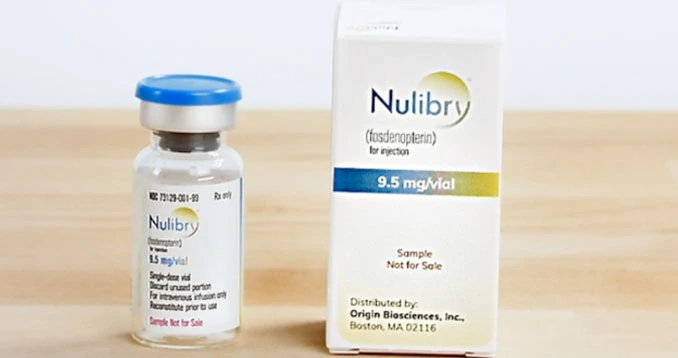
Sentynl Therapeutics Unveils First Clinical Evidence Supporting NULIBRY® for Molybdenum Cofactor Deficiency Type A
Sentynl Therapeutics, Inc., a U.S.-based biopharmaceutical company wholly owned by Zydus Lifesciences, Ltd., has announced the publication of groundbreaking clinical data regarding NULIBRY® (fosdenopterin) in the Journal of Inherited Metabolic Disease. These results, derived from three clinical studies, compare the effects of NULIBRY against a natural history study for the treatment of Molybdenum Cofactor Deficiency (MoCD) Type A, a rare genetic disorder. The data marks a significant milestone as the first comprehensive body of clinical research on the only approved treatment for MoCD Type A, providing the most detailed insights into the disease’s natural progression.
Fosdenopterin, which was approved by the U.S. Food and Drug Administration (FDA) in February 2021, as well as by the Israeli Ministry of Health, European Medicines Agency (EMA), and Medicines and Healthcare products Regulatory Agency (MHRA), is the only treatment available for this condition. It works by restoring normal sulfite levels in the brain, reducing the toxic buildup that leads to irreversible neurological damage and death. MoCD Type A is an ultra-rare, autosomal recessive disorder caused by mutations in the MOCS1 gene, which impairs the production of the molybdenum cofactor, resulting in decreased activity of sulfite oxidase, a crucial enzyme. Without this enzyme, sulfite and its toxic metabolites accumulate in the brain, causing severe neurodegeneration and premature death if untreated.
The published study results demonstrated a clear clinical benefit of NULIBRY. Treated patients showed statistically significant prolonged survival compared to untreated patients and genotype-matched controls. The risk of death was 5.1 times higher for the untreated patients, a significant difference with a p-value of 0.01 (Cox proportional hazards). In addition to survival, cognitive and motor function improvements were observed in treated patients, highlighting the potential of NULIBRY to alleviate some of the most debilitating aspects of the disease. The study also noted that the most common adverse events among treated patients were catheter-related complications and infections, though these were generally mild to moderate, and there were no discontinuations or dose modifications due to adverse events.

The clinical outcomes observed in this study underscore the potential of NULIBRY to alter the trajectory of MoCD Type A. “This publication marks the culmination of over 20 years of dedicated research,” said Guenter Schwarz, Professor at the Institute of Biochemistry at Cologne University in Germany. Schwarz has been involved in the research since the initial successful treatment of a mouse model of MoCD Type A using cPMP (the precursor to fosdenopterin). “Increased awareness and early testing are critical to improving neurological outcomes and overall survival for MoCD Type A patients,” he added, emphasizing the importance of early diagnosis and intervention.
Dr. Liza Squires, a Medical Consultant for Sentynl, also stressed the importance of early diagnosis, noting that clinicians should consider MoCD Type A in neonates presenting with symptoms such as intractable seizures, encephalopathy, feeding difficulties, or an increased startle response. “Earlier treatment appeared to improve achievement of developmental milestones,” she said, highlighting how early intervention with NULIBRY can lead to better outcomes for patients.
The publication of these results is an important milestone for Sentynl Therapeutics and for the broader MoCD Type A community. Matt Heck, CEO of Sentynl Therapeutics, expressed pride in this achievement, stating, “This study’s publication represents a critical moment for MoCD Type A patients, caregivers, and the medical community.” He also highlighted the collaboration of four companies, spanning over two decades, which culminated in the development and clinical approval of NULIBRY.
MoCD Type A is an ultra-rare condition, with an estimated incidence of 1 in 342,000 to 411,000 live births. The disease often goes underdiagnosed due to its rarity and the similarity of its symptoms to other more common conditions. The presenting symptoms, such as seizures, feeding difficulties, and encephalopathy, appear shortly after birth and are typically followed by severe developmental delays and neurodegeneration. Magnetic resonance imaging (MRI) can show the characteristic brain damage that progresses over time, leading to psychomotor impairment and an inability to communicate.
NULIBRY (fosdenopterin) for Injection is a substrate replacement therapy designed to address the underlying cause of MoCD Type A. By providing a synthetic form of cyclic pyranopterin monophosphate (cPMP), which is then converted to molybdenum cofactor, it restores the activity of sulfite oxidase and reduces the neurotoxic sulfite accumulation in the brain. This mechanism of action is vital to preventing or mitigating the neurological damage caused by the disease.
Fosdenopterin was first approved in February 2021 by the FDA for use in MoCD Type A patients, and it has since received additional regulatory approvals in Israel, the European Union, and the UK. The therapy is now the standard of care for MoCD Type A, offering a lifeline to patients and their families.
About Molybdenum Cofactor Deficiency (MoCD) Type A
MoCD Type A is a rare, autosomal recessive inborn error of metabolism caused by mutations in the MOCS1 gene, leading to a deficiency in molybdenum cofactor production. This deficiency impairs the activity of molybdenum-dependent enzymes, including sulfite oxidase, causing a buildup of toxic sulfites in the brain. If left untreated, the disease leads to irreversible neurological damage and early death. The incidence of MoCD Type A is estimated to be 1 in 342,000 to 411,000 live births.
About NULIBRY® (fosdenopterin) for Injection
NULIBRY® (fosdenopterin) is a substrate replacement therapy indicated for the treatment of MoCD Type A. It provides a synthetic source of cPMP, which is converted into molybdenum cofactor, restoring the activity of sulfite oxidase and reducing the toxic buildup of sulfites in the brain. It was first approved by the U.S. FDA in 2021 and has received regulatory approval in other regions, including the European Union and Israel, for the treatment of MoCD Type A.




